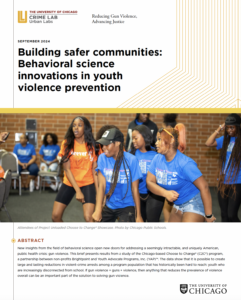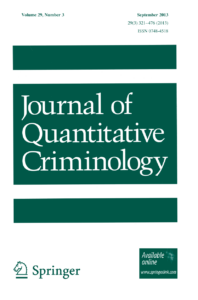Jun 2025
Longer-Term Impacts of a Youth Behavioral Science Intervention: Experimental Evidence from Chicago
This paper details updated results from a study of Choose to Change® (C2C®), a trauma-informed cognitive behavioral therapy and intensive mentoring program developed by nonprofits Brightpoint and Youth Advocate Programs, Inc. (YAP).
Abstract
We conduct a large-scale, randomized controlled trial of a six-month intervention combining intensive mentoring and group cognitive behavioral therapy (CBT) for youth in Chicago, following study participants for up to five years. The program was designed to engage young people at higher risk of engagement with the criminal justice system, and successfully did so with a take-up rate of 62%. Over 24 months, youth offered the program experienced an 18% reduction in the probability of being arrested, with no impact on number of arrests. We find a significant impact on violence engagement, with a 23% reduction in the probability of a violent-crime arrest within 24 months. We find the program’s impact in preventing any arrest persists into adulthood, up to four years post randomization. The program moderately improves school engagement in the first year as well. Sub-population analyses suggests that all youth are benefiting from the program, but that the program may be moving different outcomes for different groups of youth in ways related to baseline risk of engaging in the justice system or disengaging from school. We conclude that programs that combine CBT and mentoring can serve as a model to engaging a harder-to-reach population of youth, predominantly outside of school, and be cost effective in reducing criminal justice contact in the longer run.

Choose to Change® (C2C®) Program Guide
This program guide is intended for community-based organizations working to fill gaps in services and reach an underserved population of youth impacted by violence and trauma.

Building safer communities: Behavioral science innovations in youth violence prevention
This policy brief highlights results from a large-scale randomized controlled trial that evaluated the impact of Choose to Change® (C2C®) on participants’ criminal justice involvement.

Unpacking the Impacts of a Youth Behavioral Health Intervention: Experimental Evidence from Chicago
This working paper details results from a study of Choose to Change® (C2C®), a trauma-informed cognitive behavioral therapy and intensive mentoring program developed by nonprofits Brightpoint and Youth Advocate Programs, Inc. (YAP).

Improving Programming in Juvenile Detention: The Impact of Project Safe Neighborhoods Youth Outreach Forums
This paper presents the results of a randomized controlled trial of a youth outreach forums program run in the Cook County Juvenile Detention Center (JTDC) by the Northern Illinois Project Safe Neighborhoods Task Force.
Latest Updates
Webinar Recording: Validating CJA’s Updated Release Assessment
Crime Lab Senior Research Director Greg Stoddard provided remarks at a New York City Criminal Justice Agency (CJA) webinar on the latest validation study of CJA’s release assessment tool. The release assessment, developed in partnership with the Crime Lab, is an interview used by trained staff members to estimate whether someone will return to court if released pretrial.

Curbing gun violence in Chicago doesn’t require that we first end poverty
Crime Lab leaders Katie Hill and Jens Ludwig penned an op-ed in the Chicago Tribune highlighting the root causes of gun violence and the growing body of research showing that increased neighborhood vibrancy generates surprisingly large changes in the prevalence of gun violence, by as much as 30%.

A fighting chance
In The University of Chicago Magazine’s Fall ’25 issue, Susie Allen profiles Crime Lab Pritzker Director Jens Ludwig to discuss his book, “Unforgiving Places,” which challenges conventional wisdom on gun violence and suggests new approaches to solving the problem.

